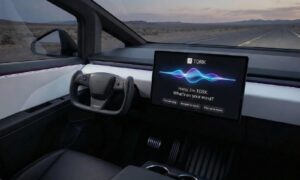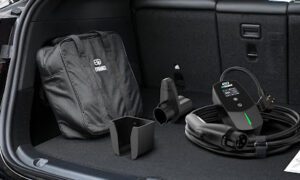Alcon Entertainment, a film and television studio, filed a lawsuit against Tesla and Warner Bros. Discovery on Monday, alleging that the companies misappropriated imagery from the movie Blade Runner 2049 to advertise Tesla’s new self-driving cybercab.
TakeAway Points:
- Movie and television studio Alcon Entertainment on Monday sued Tesla and Warner Bros Discovery over claims they used images tied to the film “Blade Runner 2049” to promote Tesla’s new autonomous cybercab.
- Warner Bros. was Alcon’s distributor for “Blade Runner 2049,” which won two 2018 Academy Awards and starred Ryan Gosling and Harrison Ford in the highly anticipated sequel to the 1982 cult classic Blade Runner.
- The lawsuit said Alcon had refused a request from Warner Bros. to use images from the firm for Tesla’s Oct. 10 live-streamed cybercab unveiling; however, Tesla then used images created with artificial intelligence that mirrored the movie for its cybercab event.
- New hybrid cars sold in the European Union in September accounted for 32.8% of total new car sales, ACEA said.
Alcon’s lawsuit over AI images
Alcon’s California federal lawsuit alleged violations of U.S. copyright law and accused Tesla of “false endorsement” for suggesting a relationship between Alcon and the Elon Musk-owned electric vehicle maker.
“Any prudent brand considering any Tesla partnership has to take Musk’s massively amplified, highly politicized, capricious and arbitrary behavior, which sometimes veers into hate speech, into account,” the lawsuit said.
Warner Bros was Alcon’s distributor for “Blade Runner 2049”, which won two 2018 Academy Awards and starred Ryan Gosling and Harrison Ford in the highly anticipated sequel to the 1982 cult classic Blade Runner.
Alcon said it had refused a request from Warner Bros to use images from the firm for Tesla’s Oct. 10 live-streamed cybercab unveiling. Tesla then used images created with artificial intelligence that mirrored the movie for its cybercab event, the lawsuit said.
In a statement, Alcon said the defendants’ “conduct is likely to cause confusion among Alcon’s ‘Blade Runner’ brand partner customers, including those it is partnering with for its upcoming ‘Blade Runner 2099’ series for Amazon Prime.”
The lawsuit did not name specific damages but said Alcon had spent hundreds of millions of dollars building the Blade Runner 2049 brand, and said the “financial magnitude of the misappropriation here was substantial.”
Hybrid cars overtake petrol-powered vehicles in EU
New hybrid cars sold in the European Union in September accounted for 32.8% of total new car sales, overtaking the monthly market share of petrol-powered vehicles for the first time, data from Europe’s auto industry body showed.
Total car sales in the block dropped by 6.1% year-on-year, the European Automobile Manufacturers Association (ACEA) said on Tuesday, as major markets Germany, France and Italy continued to stagnate.
Reasons for its importance
The sale of hybrid electric cars (HEV) has increased in the EU in recent months, as buyers see them as an affordable compromise between all-combustion and all-electric.
Fully electric (BEV) and plug-in hybrid (PHEV) car sales have instead slowed this year, in part due to diverging policies on green incentives among European countries, while regulators have imposed hefty tariffs to try to keep out cheap Chinese EVs.
Electrified vehicles – either BEV, PHEV or HEV – sold in the EU accounted for 56.9% of all new passenger car registrations in September, up from 50.3% in the previous year.
September sales of battery electric cars rose 9.8% year on year, but year-to-date sales volumes have dropped 5.8%.
Hybrid electric sales were up 12.5% on the year, while those for petrol vehicles dropped 17.9% to a market share of 29.8% in September.
Registrations at Volkswagen rose 0.3%, while they fell by 27.1% at Stellantis and by 1.5% at Renault.
“Today’s numbers illustrate that we’re still a long way away from the thriving EV market Europe needs”, ACEA Director General Sigrid de Vries said in the statement.
“This is not the steady and reliable market growth that is needed for a successful green mobility transformation.”
Volkswagen, Stellantis, and Renault are among European automakers struggling with weak demand and trying to fend off competition from China.
Earlier this month, EU member states narrowly backed import duties on Chinese-made EVs of up to 45%, meant to counter what the Brussels says are unfair subsidies from Beijing to Chinese manufacturers. Beijing denies unfair competition and has threatened countermeasures.



































